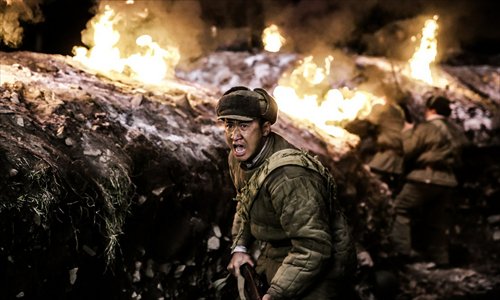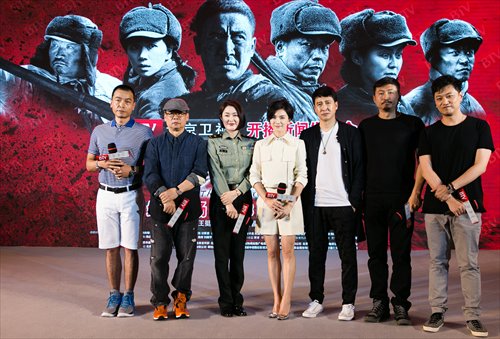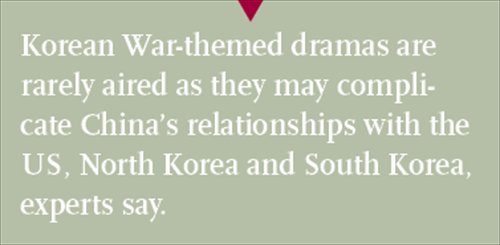Producers struggle to bring taboo Korean War drama to TV
Korean War-themed TV dramas and films have long been taboo in China, as the authorities fear they may complicate China's relationships with the US and the two Koreas. A recent drama about the war, however, made it to national TV stations and managed to walk a politically acceptable line.

A scene from the television drama The 38th Parallel. Photo: CFP
Bombs exploded, and bullets whizzed through the ear. Night had fallen, but long bursts of explosions illuminated the dense forest in the middle of the Korean Peninsula.
A unit from the Chinese People's Volunteer Army was battling South Koreans at a critical moment of the Korean War (1950-53). All one could hear was the rattling gunfire and blasts. But all of sudden, a little girl ran into the middle of the battlefield. "Daddy!" she cried out, dashing into a South Korean commander's waiting arms.
This is a scene from an episode of The 38th Parallel, a Korean War-themed television drama which breaks the decades-long taboo against Chinese TV shows or movies discussing the war. The narrative centers on the experiences of a Chinese unit which was assigned to the Korean Peninsula after the war broke out in 1950.
What happened next in the episode was so unusual for Chinese TV that it created something of an online sensation. Just as the South Korean commander and his previously missing daughter were hugging each other, Li Changshun, a Chinese soldier and the show's protagonist, pointed his gun at them. "I surrender," the South Korean major declared. However, Li, touched by the family reunion, hesitated for a few seconds and let the father and daughter flee.
Whether in China's ubiquitous anti-Japan war dramas or films about the Chinese civil war, enemies are always enemies and compassion is rarely shown. The South Korean "enemy" in The 38th Parallel, however, is carefully portrayed as a loving father and husband who has been forced into the war reluctantly. The only true villains in the drama are the US troops, who often bomb Korean civilians and coerce South Korean soldiers. North Korean soldiers are not portrayed in the drama.
As ties between China and South Korea have grown stronger in recent years, and tensions between China and the US in the South China Sea rise, The 38th Parallel - the screenplay written by Wang Haiping, the deputy head of Beijing's Municipal Publicity Bureau - strives to be politically correct in China's current political climate.
Sha Song, a Beijing-based screenwriter who watched the drama, commented, "As the first Korean War drama in decades, it is bound to be highly politically sensitive - everyone will try to interpret it in his own way. As a result, the drama is heavily constrained by politics."

Cast of the The 38th Parallel promote the new drama. Photo: CFP
Risky mission
Previous Chinese films on the Korean War were mostly made in the decade that followed the war, such as the Battle at Sanggamryong (Battle of Triangle Hill), first shown in 1956, and Heroic Sons and Daughters in 1964.
Cai Xiaoxin, a military history researcher and son of Cai Changyuan, a major general who fought in the Korean War, said unlike the War of Resistance Against Japanese Aggression (1931-45), which is largely seen as a just war on China's part, the international community holds a wide rage of views on the reasons behind and conclusion of the Korean War. "Portraying [the Chinese troops] too positively, and the [South Korean and US] troops as villains will be unacceptable for some audiences," Cai said.
As a result, Korean War-themed dramas are rarely aired as they may complicate China's relationships with the US, North Korea and South Korea, experts say.
In 2000, to commemorate the 50th anniversary of the outbreak of the Korean War, China Central Television (CCTV) produced a 30 million yuan ($4.5 million), 30-episode TV series called The War to Resist US Aggression and Aid Korea, following the official name of the war in China. Even though the drama was approved by China's top media regulator, it was never aired. This further consolidated the notion in China's film and television industry that the Korean War is a taboo topic.
This makes The 38th Parallel a risky project - both financially and politically. Wang Pei, the producer of The 38th Parallel, who also played a nurse in the show, said at one point, the project struggled to find funding. The only investor pulled out of the project just half a month before shooting was scheduled to begin. "Many investors were interested at first, but were concerned about the topic's sensitivity and worried that it may not eventually make it onto TV. They were also concerned about the profitability," she said.
Wang said the project kicked off in 2014, answering the government's call at that time for more patriotic television dramas, and was backed by Beijing's media regulator. Since 2015 was the 65th anniversary of the Korean War's outbreak, the drama aimed for CCTV's nightly slot in October 2015. "Plus, lots of veterans of the war are 80, even 90 years old. If we don't make a TV drama now to honor them, they won't be able watch it," she told the Global Times.
The cameras finally started rolling after three companies chipped in 100 million yuan. The production team built two full-size tanks for the war scenes, and went to museums in the US to study the outfits and weapons used by the soldiers in the war.

Shifting strategy
The plot went through several major changes. Wang says originally two storylines ran parallel with each other in the drama, with one focusing on the soldiers' experiences on the battlefield, and the other on how major political leaders at that time commanded the war from Beijing.
"The State Administration of Press, Publication, Radio, Film and Television asked us to cut the part involving the political leaders, which had been a minor part anyway ... We thought it was a good idea, it actually made the drama more focused on the soldiers' growth," Wang said.
The names of the peninsula's battlefields are never mentioned in the show. "Those with knowledge of this part of history will understand what war we're depicting, but the names will not appear in the drama," Wang said.
Despite the trials and tribulations it went through, CCTV decided not to air the drama, for reasons that have never been made clear. After the production team and their supporters lobbied other TV stations, the drama was aired this year on several local channels, before Beijing and Liaoning Province's satellite channels aired it nationally.
"After all, for a drama to be aired on CCTV you have to go through the Publicity Department of the CPC Central Committee. To be aired on provincial satellite TVs, you only need to go through the provincial publicity departments," Wang said.
Victors at what cost
Wang said one major difficulty when producing the drama was that "we had few precedent to refer to when we wanted to portray the troops."
In the 1960 Korean War-themed film The Raid, South Korean soldiers are depicted as ruthless villains who abuse North Korean civilians brutally and refer to the US as their "big boss."
The 38th Parallel takes a different approach. Wang said that the drama attempts to humanize the people in the war.
"We wanted to show the human aspect of the war, and tell the audience today that it is peace that we're hoping for, not war. … That's why we don't want to portray [the enemies] according to their stereotypes, but more humanely," she said.
After it was aired, it soon attracted media attention. A review published by the People's Daily said the drama is "important and timely," and the Guangming Daily commented, "in addition to a patriotic theme, the drama shows a strong humanitarian spirit."
Although the drama garnered a high score of 8.1 out of 10 on review sharing website douban.com, viewing figures have been lackluster and Wang said so far it's been commercially unsuccessful.
Some audience members still find a humanized "enemy" unacceptable, especially seeing their hero in the drama letting go of an enemy on the battlefield.
"This scene disgusted me," one viewer commented on microblogging site Weibo.
Yingxiang Juda, an online TV reviewing magazine, wrote about the reunion scene of the South Korean major and his daughter, "It is just too cheesy … and this is so disrespectful to history that it's hard to tell whether it is the responsibility of the media regulator or the production team."
Cai said the production team had to humanize the South Korean troops. "South Korea's cultural marketing strategy is so successful in China that the production team have to consider the feelings of fans of South Korea when they make a drama about the Korean War," he said.
"Under today's political situation, people's understanding of China's relationship with the two Koreas is different from before," he added.
Compared with its lenient portrayal of the South Koreans, its depiction of the US army is more critical. In several episodes depicting US prisoners of war held on the Korean Peninsula, a Chinese nurse finds indignantly that white prisoners were discriminating against and abusing a black prisoner. After she helps the black prisoner with his injuries, he gives her a photo of his mother as a token of gratitude.
"The drama is a political symbol," said Sha Song, the Beijing screenwriter.
But Sha, who is writing a script about the Korean War himself, said the drama is significant for film and television companies interested in the subject. "After The 38th Parallel, the subject will no longer be a taboo."
Newspaper headline: Battles on the box